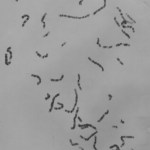neoteny
Only 1% of the human genome codes for proteins, which might make you wonder what the rest of the nucleotide sequence is good for. In 2012 the Encyclopedia of DNA Elements (or ENCODE) announced that a full 80% of the genome played a biochemical role, interacting with proteins in some way. But a new study says it takes only about 8% of our non-protein-coding genes to make us human. This is the percentage of genes that are 'conserved' by the human species: change one of these genes, and you'll alter the fitness of the individual. These genes evolve slowly (although not as slowly as protein-…
Be it in sports or comedy, they say that timing is everything. In evolution, it's no different. Many of the innovations that have separated us from other apes may have arisen not through creating new genetic material, but by subtly shifting how the existing lot is used.
Take our brains, for example. In the brains of humans, chimps and many other mammals, the genes that are switched on in the brain change dramatically in the first few years of life. But Mehmet Somel from the Max Planck Institute for Evolutionary Anthropology has found that a small but select squad of genes, involved in the…
You're looking at the face of a new species of fish and judging by the two fearsome fangs, you'll probably understand how it got its scientific name - Danionella dracula. The teeth do look terrifying but fortunately, their owner is a tiny animal just 15 millimetres long. Ralf Britz from London's Natural History Museum discovered the fanged fish in a small stream in northern Burma, just two years ago. The more he studied them, the more he realised that they are physically extraordinary in many ways.
For a start, those are no ordinary teeth - they are actually just part of the fish's jawbone…
